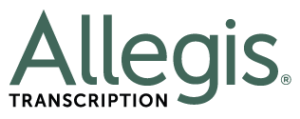Allegis Legal Transcription Services
Why should law firms use transcription services?
Justice is swift, they say. But what about “e-justice”?
Many state and local courts are successfully using digital recordings as an accurate and cost-effective means to produce, obtain and maintain court proceedings. This trickles down to the ways that attorneys themselves rely on digital audio recordings and the subsequent transcriptions.
In short, the justice system is, at least on this front, “going digital” and this could prove a very good thing for a number of concerned parties as well as those looking to access justice.
Transcriptions of digitally-recorded, in-court proceedings, depositions and interviews are not only useful for attorneys: Appellate courts also rely on transcriptions and so do judges, juries, plaintiffs and witnesses.
The trend towards digital court recordings and their subsequent transcripts doesn’t necessarily eliminate roles of either the court reporter or legal transcriptionist. If anything, it actually enhances the process of justice, moving towards what Fred Lederer, director of the Center for Legal and Court Technology (CLCT), calls a “100 percent accurate text manuscript”.
Legal transcription services that rely on audio recordings of court proceedings, hearings, depositions, etc., can now exercise an even greater level of specificity and control in the transcribing process, helping to capture not from memory or observation but from recorded sound.
What is a legal transcriptionist?
Legal transcription is the integral function of transcribing audio recordings of court proceedings, depositions, hearings, meetings, interviews and EUOs. “Integral”, because it is the coherent collection of these important materials that form the theory and structure of the case. The correct transcripts, then, can often help turn the tide on a case, capturing illuminating details. This makes legal transcription an area calling for a certain level of expertise.
Unlike court reporters seen in court, tapping away at a steno machine while court is in session, the legal transcriptionist gets to work on recorded audio files. Court reporters can review and edit the transcripts of these courts proceedings while legal transcriptionists work to capture details during audio playback, using a computer, headset and foot pedal to control the pace of the recording.
What are its uses?
A legal transcriptionist is responsible for transcribing documents like general or case-specific correspondence, pleadings, motions, discovery, depositions, interviews, hearings and court proceedings. These can be proceedings that are recorded while a case is in court, being tried, or is occurring in a lawyer’s office through depositions and witness interviews. The transcribed documents are, of course, highly useful for an attorney to refer back to and build a case on. But attorneys are not the only ones who rely on clear, transparent and comprehensive transcripts. Judges, witnesses and juries do as well.
This makes transcription services absolutely critical, whether during criminal or civil trials. Attorneys routinely face a veritable mountain of evidence, including witness interviews, depositions, forensic examinations, police reports or investigations, recordings or wiretaps, video footage and much more.
Especially in complex cases (sometimes spanning years, with a number of appeals), attorneys need to, not only go through previous notes and evidence, they must now form their own notes on the evidence. Complete clarity, conciseness and organization are the keys to finding threads of continuity or achieving breakthroughs on a case.





Leave a Reply
Want to join the discussion?Feel free to contribute!